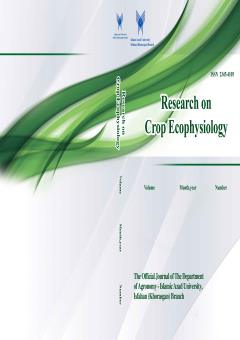Non-chemical Control Method for Management of Tomato Leafminer Tuta absoluta (Lep.: Gelechiidae) Using Biochar and Vermicompost Extracts
Subject Areas : Research On Crop EcophysiologyALYAA MAJID FADHIL AL-QURAISHI 1 , ESMAEIL MAHMOUDI 2 , ALIREZA JALALIZAND 3
1 - Department of Plant Protection, Faculty of Agriculture, Water, Food and Nutraceuticals; Isf.C., Islamic Azad University, Isfahan, Iran
2 - Department of Plant Protection, Faculty of Agriculture, Water, Food and Nutraceuticals; Isf.C., Islamic Azad University, Isfahan, Iran
3 - Department of Plant Protection, Faculty of Agriculture, Water, Food and Nutraceuticals; Isf.C., Islamic Azad University, Isfahan, Iran
Keywords: Keywords: Induced systemic resistance, Biochar, Non chemical control, Tomato, Biological control.,
Abstract :
-chemical Control Method for Management of Tomato Leafminer Tuta absoluta (Lep.: Gelechiidae) Using Biochar and Vermicompost Extracts ALYAA MAJID FADHIL AL-QURAISHI, ESMAEIL MAHMOUDI *, ALIREZA JALALIZAND Department of Plant Protection, Faculty of Agriculture, Water, Food and Nutraceuticals; Isf.C., Islamic Azad University, Isfahan, Iran *Corresponding Author: Esmaeil Mahmoudi Received: 28 February 2025 Accepted: 5 June 2025 ABSTRACT This research was aimed of investigating the effect of vermicompost tea and biochar, as plant growth enhancers, in reducing the population and damage of tomato leafminer. The experiment was performed in completely randomized design with five treatments (vermicompost tea 50/1000, vermicompost tea 75/1000, biochar 2/1000, biochar 4/1000 and control-normal water) in four replications on tomato plants. After three days of spraying the treatments, the number of larval tunnels on each pot was counted to check the effect of the treatments on the activity of the larvae. Then the second foliar spraying was done and twenty days later, active larval tunnels and adult insects were counted. The results showed that the average number of T. absoluta adults observed in the vermicompost tea treatment 50/1000 with 21.75, in the biochar treatment 2/1000 with 9, in the biochar treatment 4/1000 with 13.75, in the vermicompost tea treatment 75/1000 is 26 and and 31.5 in the control. In this study, after the first foliar spraying, tomatoes treated with biochar 2/1000 and biochar 4/1000 had the lowest number of mature moths. In the second foliar spraying of the treatments, biochar 2/1000 showed the best effect in reducing the active larval tunnels. Also, vermicompost tea 50/1000 and 70/1000 had similar effects. The results of the total number of larval tunnels also showed that the number of larval tunnels is very different in each treatment. The average number of tunnels after the first stage of foliar spraying of treatments in vermicompost tea 50/1000 is 43.75, in biochar 2/1000 is 19.5, in biochar 4/1000 is 26.75, in vermicompost tea 70/1000 is 55 and in the control is equal to sixty-nine. Keywords: Induced systemic resistance, Biochar, Non chemical control, Tomato, Biological control.
REFERENCES
Abdul Razzak AS, Al-Yasiri II, Fadhil HQ. 2010. First record of tomato borer (tomato moth) Tuta absoluta (Meyrick) (Lepidoptera: Gelechiidae) on tomato crop in Iraq. Arab and Near East Plant Protection Newsletter. 51: p 31.
Arshad U, Azeem F, Mustafa G, Bakhsh A, Toktay H, McGiffen M, Amjad Nawaz M, Naveed M, Amjad AM. 2021. Combined application of biochar and biocontrol agents enhances plant growth and activates resistance against Meloidogyne incognita in tomato. Gesunde Pflanz, 73: 591–601
Chen C, Ma T, Shang Y, Gao B, Jin B, Dan H, Li Q, Yue Q, Li Y, Wang Y. 2019. In-situ pyrolysis of Enteromorpha as carbocatalyst for catalytic removal of organic contaminants: Considering the intrinsic N/Fe in Enteromorpha and non-radical reaction. Applied Catalysis, 250: 382–395.
De Tender C, Haegeman A, Vandecasteele B, Clement L, Cremelie P, Dawyndt P, Maes M, Debode J. 2016. Dynamics in the strawberry rhizosphere microbiome in response to biochar and Botrytis cinerea leaf infection. Frontier Microbiology, 7: 2062.
Eche CO, Okafor OE. 2020. Control potential of some indigenous biochars against Meloidogyne incognita in tomato (Solanum lycopersicum L.). Journal of Entomology and Nematology, 12: 32–38.
Eppo. 2005. Data sheets on quarantine pests: Tuta absoluta. PEPP Bulletin, (35):434-435.
FAO. 2019. The State of Food and Agriculture 2019. Moving forward on food loss and waste reduction. Rome. Licence: CC BY-NC-SA 3.0 IGO.
Jaiswal AK, Alkan N, Elad Y, Sela N, Philosoph AM, Graber ER, Frenkel O. 2020. Molecular insights into biochar-mediated plant growth promotion and systemic resistance in tomato against Fusarium crown and root rot disease. Science Report, 10: 13934.
Najafabadi SM. 2014. Effect of Various Vermicompost-Tea Concentrations on Life Table Parameters of Macrosiphum rosae L. (Hemiptera: Aphididae) on Rose (Rosa hybrida L.) Flower. Journal of Ornamental & Horticultural Plants, 4(2): 348-257.
Rasool M, Akhter A, Soja G, Haider MS. 2021. Role of biochar, compost and plant growth promoting rhizobacteria in the management of tomato early blight disease. Science Report, 11: 6092.
Robredo JF, Cardeoso HJM. 2008. Strategies for control of the tomato moth, Tuta absoluta Meyrick. Agriculture Review, 77: 70-74.
Tian J, Rao S, Gao Y, Lu Y, Cai K. 2021. Wheat straw biochar amendment suppresses tomato bacterial wilt caused by Ralstonia solanacearum: Potential effects of rhizosphere organic acids and amino acids. Journal of Integrative Agriculture, 20: 2450–2462.
Wang M, Wang JJ, Tafti ND, Hollier CA, Myers G, Wang X. 2019. Effect of alkali-enhanced biochar on silicon uptake and suppression of gray leaf spot development in perennial ryegrass. Crop Protection, 119: 9–16.

